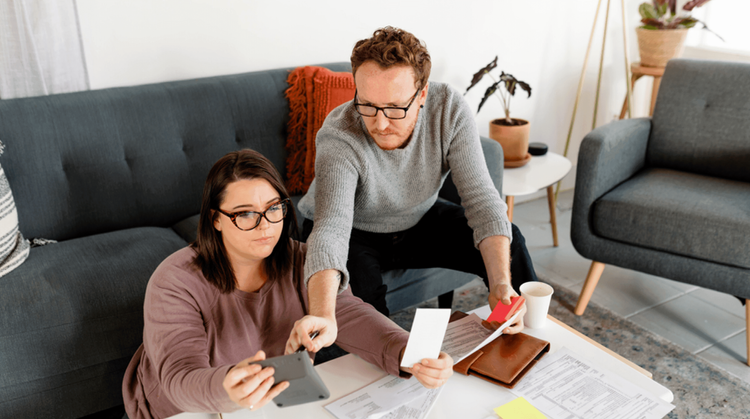How To Estimate Property Taxes On A New Construction House


by Tyler Forte
Becoming a homeowner is exciting, and buying a new construction home takes that excitement up to another level! However, building a home can be full of unknowns, and one of those areas of uncertainty is almost always the budget. Between builder upgrades, moving expenses, and closing costs, new homebuyers have to factor a lot into their budget. Then, of course, there are the taxes too!
Figuring out the taxes for a new construction house can be intimidating, time-consuming, and sometimes even feel impossible. With the correct information, you will be able to figure out how to estimate your taxes to incorporate them into your budget. Fortunately, we have pulled together all the information you need to be able to make this estimate!
What Are Property Taxes?
In general, property taxes are taxes paid on a plot of land owned by a person or a corporation. Your local government is in charge of calculating the tax amount, and then the property owner is required to pay the calculated amount.
The government then uses these taxes to help fund services given to you through your local government, including roads, water, and sewage, among others.

Depending on where you live, there are different property taxes that you will need to incorporate into your total. Let's look at the differences between them.
- County taxes: money that goes to the county that you live in.
- City taxes: money paid into the city you live in if you live within city limits.
- Village taxes: certain townships collect village taxes.
How Are Property Taxes Paid?
To fully understand property taxes, you have to know how to pay them. Whether you're paying for your house outright using cash or taking out a mortgage, you can expect to pay your property taxes in a few different ways.
Property taxes with a mortgage
If you are a homeowner paying a mortgage on your new home, you can choose to pay property taxes with your monthly mortgage payment. Your mortgage company puts money into an escrow account that equals the quarterly or annual property tax amount. Paying property taxes as part of your monthly mortgage is helpful since it can allow you to spread out the amount into monthly payments as opposed to one lump sum.
Property taxes without a mortgage
Property taxes are just as easy to pay when you don't have a mortgage, and many banks will allow you to open an escrow account to pay your property taxes when due. Another option is to make a one-time payment when property taxes are due.
What Information Do I Need To Estimate The Property Taxes On A New Construction Home?

Estimating your property taxes can be tricky, especially if your home is in a new development that hasn't been assessed. The first step is to find out the tax rate in your municipality. You can usually find this information on your city or county website. Once you know the tax rate, you can multiply it by the purchase price of your home to get an estimate of your property taxes. Your actual property tax bill will also depend on the assessed value of your home and the value of the property, which may be higher or lower than the sales price. So don't be surprised if your property taxes are slightly different from what you expected.
The assessed value of your house
The assessed value of a home is a dollar amount based on several factors. People widely accept the assessed value as the actual sale value. But we’ll dive into the difference between market and assessed value below.
The local property tax rate
A millage often sets local property taxes, and you will need to refer to your local tax authority for the millage rate they use. More on this below!
What Determines The Assessed Value Of A House?
Some of the factors that can impact your assessed value include location, local tax rates, school districts, similar homes in the area that have recently sold, upgrades you have done on the house, and even the age of the house. An inspector will assess the home based on these factors to determine your home's new value that will be used in the calculation when determining property taxes.
Assessed value vs. market value
A certified appraiser assesses the value of a home to determine what the house is worth. Appraisers are typically hired by banks or lenders when purchasing a home using a mortgage or refinancing. Their assessment gives the buyer a good idea of what they will pay for property taxes.
Market value on the other hand is what a buyer is personally willing to pay for a home on the open market. Market Value is why homes may sell for higher or lower than their appraised value. The assessed value is the standard dollar amount used to determine the value of a home for tax purposes.
What Does A Property Assessor Look At When Assessing Your Home?
Property assessors look at a range of things to determine the value of a home.

Home assessment
Property assessors will inspect the home for damage that could lead to depreciation. They will look at the size of the lot and find comparable homes with similar square feet and number of bedrooms and bathrooms. They'll also look to see if the house has had any recent improvements such as a pool or storage building.
Replacement cost
The replacement cost is how much it would cost to rebuild the house using similar materials and construction techniques. Replacement cost factors in the type of materials used. For example, House X has vinyl siding and House Y has premium brick. The replacement cost of the brick house will be higher than the vinyl house assuming both are comparable in size and floor plan.
Neighborhood amenities
Appraisers will also look at amenities in and around your neighborhood or subdivision. Neighborhood amenities can include anything from the quality of the local schools and the availability of public transportation to local parks and recreation areas.
How Is The Assessed Value Calculated If My House Is Brand New?
Depending on where you live, the assessed value of a new home will be based solely on the market value for the first year. Some cities will appraise the home after construction is complete the same way they assess other houses in the area. The appraiser will perform a valuation, reassessment, or supplemental assessment the following year to estimate more accurately. Check with your Realtor and lender to see how they do the review for your area.
How Do Local Governments Calculate The Property Tax Rate?
Local governments calculate property tax rates based on how they want to tax those living in their jurisdiction. When governments create their budgets, the most common way is to take the total amount needed and divide it by the actual home values, giving them a millage rate. Other local governments will propose bills to set the tax rate in an area.
Mill levy or millage tax
Mill levy, most commonly known as millage tax, is the rate your property is taxed. Millage is .001, which means for every $1,000 in value, you will pay $1 in taxes. For example, if you have a $500,000 home, and your millage rate is 0.720%, that would be $3,600 annually in property tax.
How to find your property tax rate
The best way to find your tax rate is to check the websites of your local and state tax authority or county assessor. You can also contact the assessor’s office for more information. Most counties and cities will have the tax rates listed on their websites. You can also contact your county or local commissioner's office.
How Do You Calculate What You Owe In Property Tax?
Most tax authorities will have your tax rate shown as a percentage. To calculate the estimated property tax, you would take the assessed value of your home and multiply it by the tax rate.
Property tax calculator: (Property assessment value) x (Tax rate) = (Property taxes).
Example calculation
If you own a $250,000 home and your tax rate is 3.5%, you would owe $8,750 (250,000x3.5%=8,750). Depending on how you pay your local taxes, you might see a change in the tax rate throughout the year.
Property Taxes For New Construction Houses
Property taxes for new construction are not as stable as a home in a fully developed area that appraisers have assessed before. The new construction home's anticipated market value is a base for the assessed or taxable value.
Property taxes on a new home vs. an existing home
The amount of property tax tends to be slightly lower on older homes compared to a newly built house because of the home's value. A new home equivalent to a ten-year-old home will generally cost more, so the property taxes will be higher. In addition, if you buy new construction, you may have to pay a full year upfront in some states.
How Do You Plan And Budget For Property Taxes In A New Construction Home?

Planning and budgeting for your property can be a stressful experience, especially if this is your first time buying a new construction home. The first place to start is by finding your tax rate. Once you have the tax rate, you will have a few options for moving forward with a plan.
- Talk with your Realtor or lender to see how appraisers determine assessment values in your area. If your area uses the market value for the first year, you can use the formula above to calculate your first-year rate.
- If they use an assessed value, you will want to get the value from the assessment. The bank or your Realtor should be able to provide you with that information. Then you can use the same formula for that calculation as well.
Property tax calculator: (Property assessment value) x (Tax rate) = (Property taxes).
Talk with your Realtor to get a more realistic estimate
Your Realtor is one of your best sources of information for calculating your new home's property tax. Realtors know local property tax rates as well as any tax breaks or deductions that are available to you. They should be able to guide you through the whole process, from finding a home that fits your specific needs to walking you through all the costs of closing on a house in your area. Use your Realtor's knowledge and experience to your advantage!
Look at comparable properties in your area for a general idea
Looking at comparable homes is a great way to get a ballpark estimate for your home. Find a house built by the same builder if possible. Then compare the property tax for homes that match the square footage, bedrooms, and bathrooms of your home.
Using comparables is the most accurate way to approximate your property tax value. Keep in mind that you could owe slightly more or less than the comparable homes in your area.
Remember to utilize deductions for property taxes on your next tax return
Property taxes are one of the many deductible expenses you can claim on your tax return. The amount of the deduction is based on the value of your property and the tax rate in your municipality. Property taxes are usually the largest deductible expense for those who own their homes.
Look for property tax exemptions
Talk with your Realtor and look on your tax authority’s website to research property tax exemptions. Many states offer exemptions for people with disabilities or military veterans receiving compensation from the Department of Veterans Affairs.
In some states, if the military veteran is a permanent resident, they will waive the property taxes altogether. However, not all states offer property tax exemptions so check with your state to see which exemptions are available for you.
Which States Have The Lowest Property Taxes?

Hawaii has been known for years to have the lowest property taxes, with a rate of 0.28%. Alabama is not far behind them, with a rate of 0.41%. These rates are the state tax rate, which does not factor in the county and local taxes.
Which States Have The Highest Property Taxes?
New Jersey has the highest tax rate of 2.49%, and Illinois is right behind that at 2.27%. Therefore, when buying a home in a state with high property taxes, you must take this into account before determining the amount you can afford for the house.
You might be able to afford a more expensive house in a different state because of the significant difference you will pay in property taxes. Always factor the cost of property taxes into your budget when determining how much you can afford.
Felix Is Simplifying The Buying Process For New Construction Homes
Felix is here to give buyers all the information in one location. Use Felix to simplify your home search. Take the stress out of finding a new construction home by signing up today and start searching for your new home.
About Felix Homes
Felix Homes is where five-star service meets low commissions! To date, we've saved our clients $1,610,738 in commission fees and have earned 120 five-star reviews on Google!
How are we able to offer five-star service AND lower commission fees? It's simple:
- We're an independently owned brokerage – not a franchise which allows us to keep more of the commission we earn.
- By offering a lower commission, more folks want to work with us which means we close more deals. By closing more deals, we can pass more savings along to our customers!
Still not convinced? Read all about our low-commission mission here.
If you have any questions about the state of the market or the home buying/selling process, please feel free to contact us at contact@felixhomes.com or 615-354-5731.




